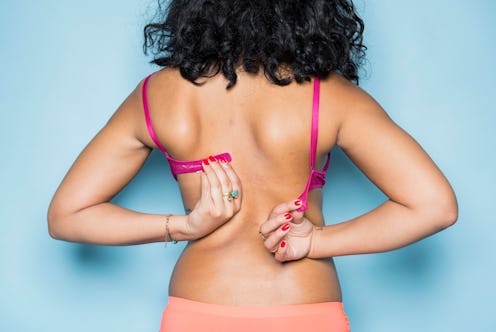Life
7 Unexpected Signs Of Breast Cancer Your Doctor Wants You To Know

After skin cancer, breast cancer is the most common cancer in the United States for women, according to the American Cancer Society. It's estimated that 12 percent of women will develop breast cancer at some point in her life, 266,120 new cases will be diagnosed before the end of 2018, and 40,920 of those women will die from breast cancer.
While death rates of the disease have dropped by 39 percent between 1989 and 2015, largely in part to awareness (as a recent study found that mammograms aren't the end all be all in diagnosis), since 2007 death of breast cancer in women under 50 have remained the same. However, in women over 50 the death rates have decreased. Much of this has to do with the thinking that breast cancer is something only older women get but that's completely false; young women do get breast cancer.
Although fewer than five percent of women under the age of 40 will be diagnosed, breast cancer in younger women tends to be more aggressive, higher-grade, and hormone receptor-negative, meaning the cancer doesn't need hormones to continue to grow and create health problems.
As is the case with most cancers, education, awareness, and early detection are key in order to increase survival right. There are more signs that you might have breast cancer than just feeling a suspicious lump in your breast.
"Many breast cancer symptoms are invisible and not noticeable without a professional screening, but some can be caught early," Dr. Shoshana Ungerleider, MD, Founder of End Well Project, tells Bustle.
So here are seven unexpected signs to look out for, according to Dr. Ungerleider.
1Nipple Discharge
For the most part, nipples aren't supposed to discharge. Of course, if you're nursing, then milk discharge is expected, and there are other factors like over-stimulated nipples or even stress that can cause nipple discharge. But, no matter the reason, Dr. Ungerleider says to see your doctor for any type of discharge.
2Change In Breast Size
"Any unexplained change in the size or shape of the breast," Dr. Ungerleider says, "[or] unexplained swelling of the breasts," are reasons to go see a doctor. While it's true that breasts can change in size during your menstrual cycle, that's an explained change. If you're experiencing anything out of the ordinary, you should see a doctor.
3Breast Dimpling
In July 2017, a UK woman posted a photo of a dimple on her breast on Facebook. Her reasoning? She had been diagnosed just the day before with breast cancer. The dimple was the only symptom she had — no lumps, no nipple discharge, nothing. In fact, when she got the biopsy she assumed she'd be fine. The results came back otherwise.
"Dimpling anywhere on the breast," Dr. Ungerleider says is a another sign that something isn't quite right.
4Inverted Nipple
Although some people are born with naturally inverted nipples, for those who aren't, Dr. Ungerleider says that if a nipple has "turned slightly inward" or become inverted, that's a sign that something is up.
5Changes To The Breast Skin
Sure, the winter months can take a toll on the epidermis — from head to toe, including your breasts — but there's a big difference between dry, itchy skin and skin that's scaly and swollen.
Dr. Ungerleider says to get to a doctor if "skin of the breast, area around nipple, or nipple... becomes scaly, red, or swollen."
If moisturizing isn't cutting it, then it may be a sign it's not just the winter months having its way with your skin.
6Breast Shrinkage
"Unexplained shrinkage of the breast, especially if on one side only," Dr. Ungerleider says, is sign to have your breasts examined. Fluctuation is one thing, but noticeable shrinkage without a reason is something worth seeing your doctor about.
7Your Breasts Start To Resemble The Skin Of An Orange
While it may not be the most pleasant of things to imagine, according to Dr. Ungerleider, if the "skin of the breast, area around the nipple or the nipple has ridges or pitting resembling the skin of an orange," you should see your doctor.
If you experience any of these signs, be sure to visit your doctor for an evaluation. It's only with early detection that people have a higher chance of beating breast cancer.
This article was originally published on